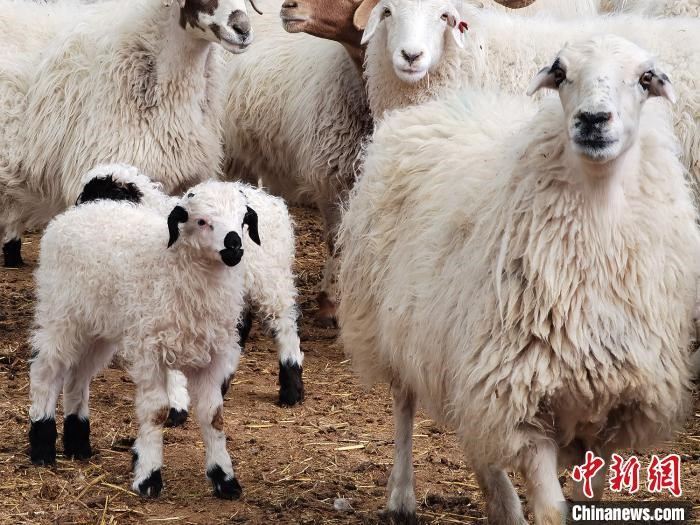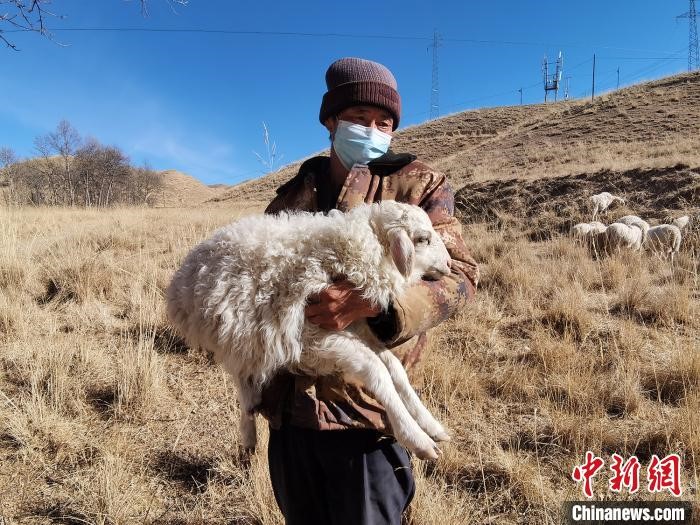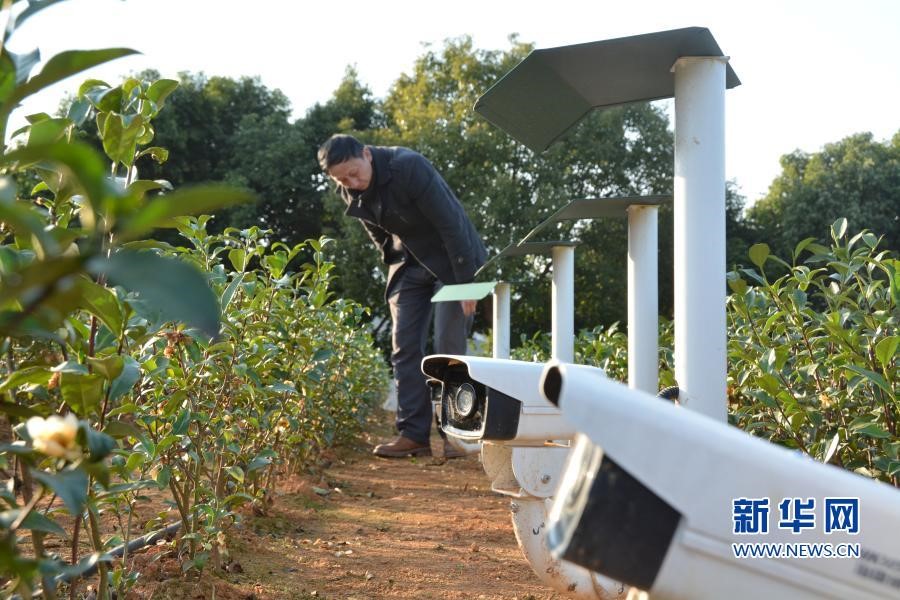

A flock of sheep graze in grassy pastures of Dongxiaka village, with their owners monitoring them 1,600 miles away. Strolling around the grand complex of Chiyou Jiuli Town, millions of tourists can savor the culture of the Miao ethnic group through video games.

A flock of sheep in Dongxiaka village, Hainan Tibetan Autonomous Prefecture, southwest Qinghai Province. (Chinanews.com/Qi Zengpei)
Internet pumps new life into rural regions
For residents in Jiangsu Province, the eastern coast of China, raising sheep online has become a prevailing tendency. Paying a 500 hundred yuan deposit, they can enjoy the virtual pet experience by adopting a sheep from Dongxiaka village. Once their sheep reaches maturity, the owner must buy it based on the market price in Jiangsu Province. As a critical program of Jiangsu-Qinghai pairing-off cooperation for poverty reduction, "I Have A Sheep in Qinghai" aims to boost Qianghai shepherds' income by reaching more customers in Jiangsu Province.
"The supply of sheep in Qinghai is greater than the demand, so the market price and sales are much lower than other provinces, which renders many shepherds at a loss," said Wang Xuejun, a director of the Poverty Alleviation and Development Bureau in Hainan Tibetan Autonomous Prefecture, Qinghai Province. "This program expands the market to Jiangsu Province, where people have a high demand for sheep," he added
"Seeing my sheep wander in endless pastures satisfies my dream of an idyllic lifestyle," said Lu Xi, a 25-year old in Jiangsu. "I hope one day I can visit my pet in person," she added.
Xiao Shuihong, in her 40s, joined this cloud sheep-raising program for a different reason. "From this program, I can buy high-quality mutton with a more transparent breeding process," she said. All sheep listed on the program website were sold within a few months.

An Liquan and his sheep (Chinanews.com/Qi Zengpei)
An Liquan, a shepherd with more than 10 years of breeding experience, often loses money as his sheep are unsellable during the off-peak season. Things changed after he joined this program. Selling out of all of his sheep, he decided to scale up the business next year.
"This program not only solves the sales problem but also increases the profit of each sheep by more than 200 yuan," An said.
The shepherds are not the only group who benefit from this program, so do people in the tourism industry. "Held spellbound by the stunning landscape and the emotional connection of their sheep, some people turn the online monitoring to offline traveling," said Kan Yilong, one of the organizers of this program. With the increasing number of tourists, the revenues of local businesses, such as restaurants, are soaring.

Aerial photo taken on July 6, 2019 shows the Chiyou Jiuli Town scenic spot in Pengshui County, southwest China's Chongqing Municipality. The Chiyou Jiuli Town focuses on displaying history and culture of the Miao ethnic group. (Xinhua/Wang Quanchao)
Another rural region 1,677 miles away also reaps the benefit of technology. Pengshui Miao and Tujia Autonomous County, in west China's Chongqing, has leaped from an impoverished area to a bustling tourist attraction.
Tencent, one of China's Internet giants, introduced elements of the Miao ethnic group, including characteristic architectures and Miao style costumes, into its most downloaded game War for Peace. The game uses the map and virtual replica of Chiyou Jiuli Town, a scenic spot in Pengshui County, to promote the picture-postcard view of Pengshui and the long-lasting culture of the Miao ethnic group. During the promotion period in 2020, billions of gamers toured Pengshui in the virtual world every day.
"The game increases Pengshui's popularity, and the game-related culture attracts gamers to Pengshui," said Hu Xujun, an executive of War for Peace, in an interview with CCTV.
Against the backdrop of the COVID-19 pandemic, Pengshui received 1.48 million tourists during the week-long National Day holiday in 2020, with gamers crowding to their place of pilgrimage. Strolling around the winding path of Jiuli, Liu Huan, a big fan of War of Peace, took photos in front of every building that appears in the game. "That's why I came here," she said.
According to the data released by local authorities, the total tourism revenue in Pengshui reached 630 million yuan (97 billion US dollars) in 2020, a year-on-year increase of 7.3 percent.
Tech builds a promising future
Dongxiangka and Pengshui are among thousands of villages that see the Internet as a key to boost the economy . Internet plus agriculture, using digital platforms to promote agricultural products, services and tourism, has become the most significant trend in China's rural regions.
"Thanks to digital platforms, farmers and remote regions are connected to the nationwide market, which provides them with more cost-effective and efficient channels to sell their products or services," said Yi Hongmei, an associate professor of the School of Agricultural Sciences at Perking University.
According to the data released by China’s Ministry of Commerce, e-commerce sales of rural regions reached 1.7 trillion yuan (260 billion US dollars) in 2019, 8.4 times higher than the figure in 2014.
“In the future, digital agriculture would be the crucial force to China’s rural and agriculture modernization," said Yi.
The Internet alone cannot advance China's rural modernization. The 14th Five-Year (2021-2025) Plan outlined that the country will make great progress in advancing a modernized economy, developing key agricultural technologies and building demonstration areas of smart agriculture.

The world’s first 5G driverless tractor was invented in Luoyang in 2020, which has the potential to significantly change the world’s agricultural industry. (People’s Daily Online/Du Mingming)
From drone irrigation to 5G driverless tractors, villages are accelerating the application of digital technologies, as China released a 2019-2025 development plan for digital agriculture and rural development in January 2020, aiming to faster integrate with systems involving agricultural industry, production and operation.
In July, seven Chinese authorities jointly issued a circular on executing a pilot project on digital villages involving exploration of new models for rural digital economy.
Among the first batch of 117 national pilot digital villages, Fu’an, in Southeast China’s Fujian Province, has launched a demonstrative program of the 5G tea plantation where the top-notch technologies, such as 5G, Internet of Things, big data and cloud service, are applied. For instance, precise irrigation and pest control can be conducted automatically based on the information collected by sensors; experts can diagnose crop disease remotely by using real-time videos.
"In the past, we planted tea by experience, but now precise information analyzed by technologies offers great help," said Liu Quansheng, an employee from the 5G tea plantation program. With higher tea yield and declining costs, the plantation revenue increased by 500 yuan per Mu (1 hectare=15 Mu) , compared to the traditional tea plantation.

Camera sensors monitor pests. (Xinhua/Lin Chao)
The 5G tea plantation in Fu’an epitomizes the implementation and benefits of the pilot digital village program. Featuring data collecting, early reminders and warnings of environmental factors, and intelligent analysis, digital agriculture could improve agriculture efficiency and liberate the workforce.

 Award-winning photos show poverty reduction achievements in NE China's Jilin province
Award-winning photos show poverty reduction achievements in NE China's Jilin province People dance to greet advent of New Year in Ameiqituo Town, Guizhou
People dance to greet advent of New Year in Ameiqituo Town, Guizhou Fire brigade in Shanghai holds group wedding
Fire brigade in Shanghai holds group wedding Tourists enjoy ice sculptures in Datan Town, north China
Tourists enjoy ice sculptures in Datan Town, north China Sunset scenery of Dayan Pagoda in Xi'an
Sunset scenery of Dayan Pagoda in Xi'an Tourists have fun at scenic spot in Nanlong Town, NW China
Tourists have fun at scenic spot in Nanlong Town, NW China Harbin attracts tourists by making best use of ice in winter
Harbin attracts tourists by making best use of ice in winter In pics: FIS Alpine Ski Women's World Cup Slalom
In pics: FIS Alpine Ski Women's World Cup Slalom Black-necked cranes rest at reservoir in Lhunzhub County, Lhasa
Black-necked cranes rest at reservoir in Lhunzhub County, Lhasa China's FAST telescope will be available to foreign scientists in April
China's FAST telescope will be available to foreign scientists in April